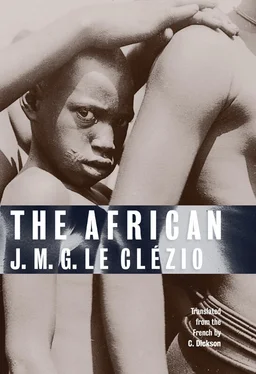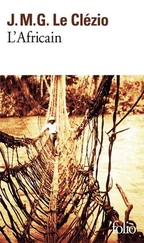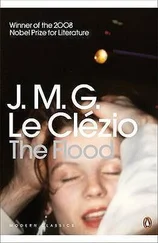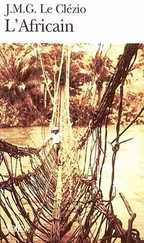I can hear the voices of children shouting, they are calling to me, they’re in front of the hedge at the entrance to the garden, they’ve brought their pebbles and their sheep vertebrae to play, to take me on a garter snake hunt. In the afternoon, after the arithmetic lesson with my mother, I’ll sit down on the cement of the veranda, before the oven of the white sky to make clay gods and bake them in the sun. I remember each one of them, their names, their raised arms, their masks. Alasi, the god of thunder, Ngu, Eke-Ifite the mother goddess, Agwu the prankster. But there are many more, every day I make up a new name, they are my chis , the spirits that protect me and intercede with God on my behalf.
I’ll watch the fever rise in the twilit sky, the lightning snake silently between the scales of gray clouds wreathed in fire. When the night has grown black, I’ll listen to the steps of the thunder slowly approaching, the swell that makes my hammock rock and blows on the flame of my lamp. I’ll listen to my mother’s voice counting the seconds that separate us from the impact of the lightning and calculating its distance at the rate of three hundred and thirty-three meters per second. At last the wind and the extremely cold rain, moving along the crowns of the trees with all of its might; I can hear each branch groan and crack, the air in the room fills with the dust stirred up by the rain as it hits the ground.
It is all so far away, so close. A simple partition as thin as a mirror separates the world of today and that of yesterday. I’m not speaking of nostalgia. That dereistic affliction has never been a source of pleasure for me. I’m speaking of substance, of sensations, of the most logical part of my life.
Something was given to me, something was taken away from me. That which is definitively absent from my childhood: having had a father, having grown up by his side in the comfort of the family circle. I know, with no regrets or extraordinary illusions, that I lacked that. When a man watches the light on the face of the woman he loves day after day, when he tries to catch every sly glimmer in his child’s eye. All of the things that can never be captured in any portrait or photograph.
But I remember everything I received when I arrived in Africa for the first time: such intense freedom that it burned inside of me, inebriated me, gave me so much pleasure it was painful.
I don’t mean to speak of exoticism: children are absolute strangers to that vice. Not because they see through beings and objects, but precisely because they see nothing but them: to me a tree, a hollow in the land, a column of carpenter ants, a band of turbulent kids looking for a game, an old man with blurry eyes holding out an emaciated hand, a street in an African village on market day, were every street in every village, every old man, every child, every tree, and every ant. That treasure is still alive deep within me, it cannot be eradicated. Much more than simple memories, it is made up of basic truths.
If I had not experienced that carnal knowledge of Africa, if I had not inherited the part of my life before my birth, what would I have become?
Today I’m alive, I travel, I have in turn founded a family, I have taken root in other places. Yet at all times, like an ethereal substance floating between the partitions of reality, I am traversed by those days of old in Ogoja. In waves, it floods over me, and leaves me in a daze. Not only that childhood memory, extraordinarily precise with regard to all the sensations, the odors, the tastes, the impression of relief and empty spaces, the sensation of duration.
It is in writing it down that I now understand. That memory is not mine alone. It is also the memory of the time that preceded my birth, when my mother and father walked together on the highland trails, in the kingdoms of western Cameroon. The memory of my father’s hopes and fears, his loneliness, his distress in Ogoja. The memory of moments of happiness, when my mother and father are united in love that they believe to be eternal. Back then, they walked freely on the trails and the names of places penetrated me like family names, Bali, Nkom, Bamenda, Banso, Nkong-samba, Revi, Kwaja. And the names of lands, Mbembé, Kaka, Nsungli, Bum, Fungom. The high plateaus where the herds of cattle with moon-shaped horns snagging the clouds move slowly forward between Lassim and Ngonzin.
Perhaps in the end, my old dream wasn’t wrong. Though my father became the African by force of destiny, today I think I can truly believe in the existence of my African mother, the one who embraced and nourished me at the moment of my conception, the moment of my birth.
DECEMBER 2003–JANUARY 2004












